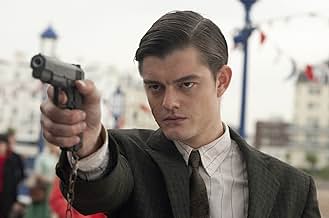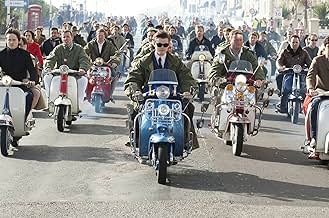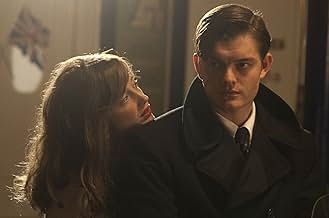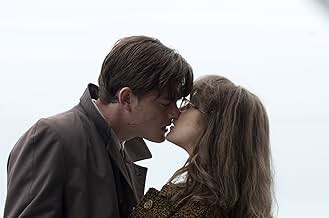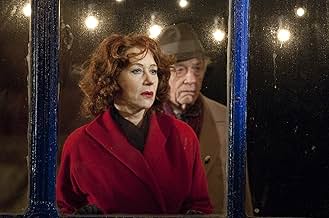IMDb RATING
5.7/10
6.9K
YOUR RATING
Charts the headlong fall of Pinkie, a razor-wielding disadvantaged teenager with a religious death wish.Charts the headlong fall of Pinkie, a razor-wielding disadvantaged teenager with a religious death wish.Charts the headlong fall of Pinkie, a razor-wielding disadvantaged teenager with a religious death wish.
- Awards
- 1 win & 8 nominations total
Phil Davis
- Spicer
- (as Philip Davis)
- Director
- Writers
- All cast & crew
- Production, box office & more at IMDbPro
Featured reviews
7rbrb
This is a dark,intense 'film noir' type drama.
The backdrop to it is Brighton, England of the 1960's with rebelling youth(mods and rockers).The actual story is about a young murderous psychopath thug involved in a gang war. A gullible waitress unwittingly becomes a witness to murder and the thug needs to deal with it.
The movie is atmospheric and grim. No hint of much happiness nor any likable characters.Everyone in the movie is flawed in one way or another. Maybe that is why many people did not rate this movie highly.
There is a religious and moral agenda in this picture which if recognized may disturb some viewers.
I thought all the main actors gave edgy and compelling performances. The 2 leads namely Sam Riley and Andrea Riseborough are outstanding with on balance the latter stealing the show.
The very last scene in the film is brilliant and thought provoking.
7/10
The backdrop to it is Brighton, England of the 1960's with rebelling youth(mods and rockers).The actual story is about a young murderous psychopath thug involved in a gang war. A gullible waitress unwittingly becomes a witness to murder and the thug needs to deal with it.
The movie is atmospheric and grim. No hint of much happiness nor any likable characters.Everyone in the movie is flawed in one way or another. Maybe that is why many people did not rate this movie highly.
There is a religious and moral agenda in this picture which if recognized may disturb some viewers.
I thought all the main actors gave edgy and compelling performances. The 2 leads namely Sam Riley and Andrea Riseborough are outstanding with on balance the latter stealing the show.
The very last scene in the film is brilliant and thought provoking.
7/10
As a Brighton resident, I had to see this, but also probably spent more time looking at the locations (and more critically) than a normal viewer. On the plus side, there is excellent cinematography, and the film creates an atmospheric mid 60's version of Brighton that might be convincing to anyone too young to remember that time, but which contained too many jarring anachronisms for me. For example Rose lives in a tower block, which could have existed in 1964, and would have still been soulless and depressing, but would also have been practically brand spanking new, not run down and shabby with 20 years of neglect. This highlights another failing of the film, the clichéd exaggerated unrelenting squalor that all the criminals live in, which again is untrue to the period, twitching net curtains and keeping up (often threadbare) appearances was how things worked then, in working class neighbourhoods especially. You could create an oppressive atmosphere from these real elements (and the culture clash of the pre and post war worlds) perhaps more easily than from this invented total squalor.
So if the world the film creates is a Hollywood version of 1960's Brighton, do the characters engage you? Well I loved Helen Mirren and John Hurt, they brought a touch of class whenever they appeared, and Phil Davis is another very fine actor who is always watchable. Sadly the two main characters don't quite pull it off, and if I have to lay the blame it is chiefly with Sam Riley's Pinkie. If he could have alternated his cold unsmiling thuggishness with some charm, shown Rose a little tenderness some vulnerability even, that would have made her falling for him, and her naive notion that she could save him more convincing, and maybe made his cruelty and occasional physical violence toward her more shocking. Andrea Riseborough as Rose gives a fair performance, given that she does not have much to work with.
I'm sorry if this review makes the film sound worse than it is, because truth be told despite its failings it is consistently watchable, and still managed to engage me. An interesting failure.
So if the world the film creates is a Hollywood version of 1960's Brighton, do the characters engage you? Well I loved Helen Mirren and John Hurt, they brought a touch of class whenever they appeared, and Phil Davis is another very fine actor who is always watchable. Sadly the two main characters don't quite pull it off, and if I have to lay the blame it is chiefly with Sam Riley's Pinkie. If he could have alternated his cold unsmiling thuggishness with some charm, shown Rose a little tenderness some vulnerability even, that would have made her falling for him, and her naive notion that she could save him more convincing, and maybe made his cruelty and occasional physical violence toward her more shocking. Andrea Riseborough as Rose gives a fair performance, given that she does not have much to work with.
I'm sorry if this review makes the film sound worse than it is, because truth be told despite its failings it is consistently watchable, and still managed to engage me. An interesting failure.
I went to see this film with some trepidation. The original Graham Greene novel is very good and one of my favourites. The original film from 1947 was also extremely good, with Richard Attenborough as an unlikely but splendid villain. However this version was excellent. The fact that it had been updated to the 60s, which had worried me a little, worked well. Of course it did not have the period feel, but the aggression, violence and fighting for territory of the Mods and Rockers (which I remember well) echoed beautifully the behaviour of the gangsters and gave the opportunity for some very effective scenes visually. The acting I found completely plausible, with Phill Davies, John Hurt, Sam Riley and Andrea Riseborough all giving authentic portrayals. Helen Mirren, perhaps, looked a little too glamorous physically, but her acting was fine. Brighton itself was a wonderful additional character in all this. The contrast between the somewhat mindless hedonism of the holiday makers and the violent and ugly activities of the underworld was extremely effective and the use of the landscape beautiful and horrific in equal measure. The theme of sin, guilt and Catholicism was probably not dealt with as interestingly as in the novel, but that is a frequent limitation of the medium of film. Why on earth the makers of the film felt that they were entitled to "improve" on Graham Greene's ending I do not know. But it did not spoil my overall judgement that this was a very good film. I hope it will inspire those who have not already done so to read the novel.
One of the perils of remaking a classic film is that your version will be compared unfavourably with the original. Of course, there have always been film-makers who have dared to brave this peril, and it is as well that there have been, otherwise we would have been deprived of, for example, Kenneth Branagh's interpretation of "Henry V", which spoke to the eighties just as Laurence Olivier's had spoken to the forties.
Graham Greene's novel "Brighton Rock" was famously adapted for the screen by the Boulting brothers in 1947, and their version is widely regarded as one of the greatest films from the "Golden Age" of the British cinema during the forties and fifties. Rowan Joffé's recent remake has not been universally well-received, particularly by those who believe that nothing can ever compete with its illustrious predecessor. Much as I admire the Boultings' film, however, I have to admit that the newcomer has many virtues of its own.
The main character is Pinkie Brown, the youthful leader of a gang of thugs whose principal activity is protection racketeering. Early in the film, Pinkie murders Hale, a member of a rival gang, in revenge for the murder by Hale of Pinkie's colleague Kite. (In the original novel and the 1947 film, Hale was a journalist who had been investigating the gang's activities. Another change is the date at which the story takes place; although the novel and original film are both set in the 1930s, this adaptation is set during the Mods and Rockers era of the 1960s).
Pinkie tries to cover his tracks by creating a false alibi for himself, which leads to the commission of further crimes and to Pinkie's marriage to Rose, a young waitress who he believes might be in possession of evidence which could send him to the gallows. Pinkie is not in love with Rose, but marries her because at the time the film is set there was a rule of English law that a wife could not give evidence against her husband. The ending is closer to the one Greene wrote in his novel, although Joffé keeps the famous twist which the writer introduced when he produced the 1947 screenplay.
Joffe said that he made the film because, on reading the novel, he "fell absolutely in love with the character of Rose", and the treatment of this character is, in my view, the one area in which the modern film is better than the earlier one. Andrea Riseborough's interpretation of the character- downbeat, dowdy, bespectacled and needy- seems just right for the role. Rose responds to Pinkie's overtures because he is the only person to have shown her any affection, and she is naïve enough to overlook his obvious criminality and not to realise that his affection for her is feigned. Carol Marsh's Rose, however, was rather too glamorous; it was difficult to imagine her as someone lacking in male admirers.
There are also good performances from two veterans of the British cinema, John Hurt and Helen Mirren. Hurt plays the bookmaker Phil Corkery, who has a more important role in this adaptation than he does in the book. Mirren plays Ida Arnold, the woman whose determination to get at the truth results in Pinkie's downfall. In the 1947 Ida was played by Hermione Baddeley as a blowsy, ageing showgirl and a casual acquaintance of Hale; here she becomes the manageress of the café where Rose works and a close friend of the murdered man.
I was less impressed by Sam Riley who, as Pinkie, lacked the sense of menace and evil which Richard Attenborough brought to the role. At 30, moreover, Riley seemed too old to play a teenager. (Attenborough would have been 24 in 1947, and looked younger). Also, I couldn't see the point of setting the story in the 1960s, as the "Mods and Rockers" element added little, or nothing, to Greene's story. Pinkie's gang, and the rival Colleoni gang, were both part of Brighton's own criminal underworld, whereas the Mods and Rockers were drawn from all over the country, especially London, and merely chose Brighton, and other seaside resorts, as convenient places for their battles.
Joffé has also discarded a lot of the religious content of the original novel. Greene made Ida an atheist whose system of values was based upon secular ideas of "right" and "wrong", as opposed to Pinkie and Rose, both believing Catholics who believed firmly in "good" and "evil". This opposition between two contrasting attitudes to morality was an important theme of the novel, but it is not something dwelt on at length in either film. The 1947 version downplayed Pinkie's religious beliefs, possibly as a concession to Catholics unhappy with the idea of one of their flock being portrayed as a violent criminal, although it did concentrate on Rose's spiritual development. The modern film acknowledges that both Pinkie and Rose are "Romans", but for the most part avoids theological issues and turns Greene's story into the basis for a grim, grey neo-noir type crime thriller. (The 1947 film was set during a sunny summer Bank Holiday; this version appears to have been shot in winter, with Brighton largely deserted by holidaymakers). It is up to the viewer to decide which approach he or she prefers. 7/10
Graham Greene's novel "Brighton Rock" was famously adapted for the screen by the Boulting brothers in 1947, and their version is widely regarded as one of the greatest films from the "Golden Age" of the British cinema during the forties and fifties. Rowan Joffé's recent remake has not been universally well-received, particularly by those who believe that nothing can ever compete with its illustrious predecessor. Much as I admire the Boultings' film, however, I have to admit that the newcomer has many virtues of its own.
The main character is Pinkie Brown, the youthful leader of a gang of thugs whose principal activity is protection racketeering. Early in the film, Pinkie murders Hale, a member of a rival gang, in revenge for the murder by Hale of Pinkie's colleague Kite. (In the original novel and the 1947 film, Hale was a journalist who had been investigating the gang's activities. Another change is the date at which the story takes place; although the novel and original film are both set in the 1930s, this adaptation is set during the Mods and Rockers era of the 1960s).
Pinkie tries to cover his tracks by creating a false alibi for himself, which leads to the commission of further crimes and to Pinkie's marriage to Rose, a young waitress who he believes might be in possession of evidence which could send him to the gallows. Pinkie is not in love with Rose, but marries her because at the time the film is set there was a rule of English law that a wife could not give evidence against her husband. The ending is closer to the one Greene wrote in his novel, although Joffé keeps the famous twist which the writer introduced when he produced the 1947 screenplay.
Joffe said that he made the film because, on reading the novel, he "fell absolutely in love with the character of Rose", and the treatment of this character is, in my view, the one area in which the modern film is better than the earlier one. Andrea Riseborough's interpretation of the character- downbeat, dowdy, bespectacled and needy- seems just right for the role. Rose responds to Pinkie's overtures because he is the only person to have shown her any affection, and she is naïve enough to overlook his obvious criminality and not to realise that his affection for her is feigned. Carol Marsh's Rose, however, was rather too glamorous; it was difficult to imagine her as someone lacking in male admirers.
There are also good performances from two veterans of the British cinema, John Hurt and Helen Mirren. Hurt plays the bookmaker Phil Corkery, who has a more important role in this adaptation than he does in the book. Mirren plays Ida Arnold, the woman whose determination to get at the truth results in Pinkie's downfall. In the 1947 Ida was played by Hermione Baddeley as a blowsy, ageing showgirl and a casual acquaintance of Hale; here she becomes the manageress of the café where Rose works and a close friend of the murdered man.
I was less impressed by Sam Riley who, as Pinkie, lacked the sense of menace and evil which Richard Attenborough brought to the role. At 30, moreover, Riley seemed too old to play a teenager. (Attenborough would have been 24 in 1947, and looked younger). Also, I couldn't see the point of setting the story in the 1960s, as the "Mods and Rockers" element added little, or nothing, to Greene's story. Pinkie's gang, and the rival Colleoni gang, were both part of Brighton's own criminal underworld, whereas the Mods and Rockers were drawn from all over the country, especially London, and merely chose Brighton, and other seaside resorts, as convenient places for their battles.
Joffé has also discarded a lot of the religious content of the original novel. Greene made Ida an atheist whose system of values was based upon secular ideas of "right" and "wrong", as opposed to Pinkie and Rose, both believing Catholics who believed firmly in "good" and "evil". This opposition between two contrasting attitudes to morality was an important theme of the novel, but it is not something dwelt on at length in either film. The 1947 version downplayed Pinkie's religious beliefs, possibly as a concession to Catholics unhappy with the idea of one of their flock being portrayed as a violent criminal, although it did concentrate on Rose's spiritual development. The modern film acknowledges that both Pinkie and Rose are "Romans", but for the most part avoids theological issues and turns Greene's story into the basis for a grim, grey neo-noir type crime thriller. (The 1947 film was set during a sunny summer Bank Holiday; this version appears to have been shot in winter, with Brighton largely deserted by holidaymakers). It is up to the viewer to decide which approach he or she prefers. 7/10
BRIGHTON ROCK is a British remake of the 1947 brilliant film noir based on the novel by Graham Greene an adapted for the screen by Graham Greene and Terrance Rattigan. This BRIGHTON ROCK has been updated from the original 1930s setting to the 1960s and the screenplay is by Rowan Joffe (who also directs) - tough competition with the original writers! The result is a dark film that relies on performances by some actors who are not up to the task and makes them seem even more weak by the presence of such brilliant actors in smaller roles as Helen Mirren, John Hurt, Philip Davis and Andrea Riseborough.
The story takes place in 1964 in Brighton, once a quiet seaside town, is suddenly overrun by gangs of sharp suited Mods and greasy Rockers looking for a riot. Looking to be the top Mod gangster, Pinkie Brown (Sam Riley) will stop at nothing to be the biggest name in the crime world - bigger than the competitor Colleoni (Andy Serkis). Pinkie witnesses the vicious death of fellow Mod Kite (Goeff Bell) and is determined to kill the perpetrator Hale (Sean Harris). Pinkie's ruthless and violent ambition takes over his mission and when he discovers that a waitress named Rose (Andrea Riseborough) who works at Snows, a café run by Ida (Helen Mirren), is involved tangentially in the murders, Pinkie decides to court the plain Jane Rose, knowing that if he marries her she cannot testify against him should she discover Pinkie's guilt in the murders. Ida had a 'connection' with Hale and sees through the veils of deceit Pinkie is placing on the innocent Rose, and she and her longtime friend Phil (John Hurt) undermine Pinkie's plans. Pinkie marries Rose - a gesture that secures Rose's fascination and new love for Pinkie - to keep her from testifying against him. As factors around the conflicts between the two gangs tighten and Pinkie fears for his end, he convinces his new bride to take part in a mutual suicide, an act that has a surprising end.
What is missing in this updated adaptation is Graham Greene's important emphasis on the theme of sin, guilt and Catholicism: there are attempts to bring these concepts into the script but they become of lesser importance than the action and dark evocation of a period piece. There mood is well described by the cinematography of John Mathieson, but the single most effective aspect of this film is the brilliant music score by the gifted British composer Martin Phipps, godson of Benjamin Britten. Were there not an original film for comparison the film would likely be better accepted. But for those who are ardent fans of the novels of Graham Greene this film adaptation will likely disappoint. It is currently available On Demand and simultaneously in theaters before the DVD is released here.
Grady Harp
The story takes place in 1964 in Brighton, once a quiet seaside town, is suddenly overrun by gangs of sharp suited Mods and greasy Rockers looking for a riot. Looking to be the top Mod gangster, Pinkie Brown (Sam Riley) will stop at nothing to be the biggest name in the crime world - bigger than the competitor Colleoni (Andy Serkis). Pinkie witnesses the vicious death of fellow Mod Kite (Goeff Bell) and is determined to kill the perpetrator Hale (Sean Harris). Pinkie's ruthless and violent ambition takes over his mission and when he discovers that a waitress named Rose (Andrea Riseborough) who works at Snows, a café run by Ida (Helen Mirren), is involved tangentially in the murders, Pinkie decides to court the plain Jane Rose, knowing that if he marries her she cannot testify against him should she discover Pinkie's guilt in the murders. Ida had a 'connection' with Hale and sees through the veils of deceit Pinkie is placing on the innocent Rose, and she and her longtime friend Phil (John Hurt) undermine Pinkie's plans. Pinkie marries Rose - a gesture that secures Rose's fascination and new love for Pinkie - to keep her from testifying against him. As factors around the conflicts between the two gangs tighten and Pinkie fears for his end, he convinces his new bride to take part in a mutual suicide, an act that has a surprising end.
What is missing in this updated adaptation is Graham Greene's important emphasis on the theme of sin, guilt and Catholicism: there are attempts to bring these concepts into the script but they become of lesser importance than the action and dark evocation of a period piece. There mood is well described by the cinematography of John Mathieson, but the single most effective aspect of this film is the brilliant music score by the gifted British composer Martin Phipps, godson of Benjamin Britten. Were there not an original film for comparison the film would likely be better accepted. But for those who are ardent fans of the novels of Graham Greene this film adaptation will likely disappoint. It is currently available On Demand and simultaneously in theaters before the DVD is released here.
Grady Harp
Did you know
- TriviaPhil Davis (Frank Spicer) previously played the mod Chalky in Quadrophenia (1979), which was likewise set in Brighton in 1964.
- GoofsWhen Rose opens the record player, it has a modern British plug on it. In 1960s Britain plug pins were round. Safety switches wall sockets would not have been in place at this time, either.
- ConnectionsFeatured in Breakfast: Episode dated 28 January 2011 (2011)
- How long is Brighton Rock?Powered by Alexa
Details
- Release date
- Countries of origin
- Official site
- Language
- Also known as
- Băng Đảng Brighton
- Filming locations
- Production companies
- See more company credits at IMDbPro
Box office
- Budget
- $12,000,000 (estimated)
- Gross US & Canada
- $229,653
- Opening weekend US & Canada
- $32,774
- Aug 28, 2011
- Gross worldwide
- $2,913,599
- Runtime1 hour 51 minutes
- Color
- Sound mix
- Aspect ratio
- 2.39 : 1
Contribute to this page
Suggest an edit or add missing content





